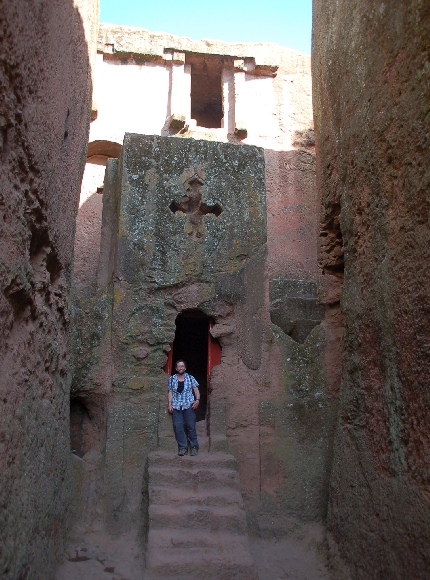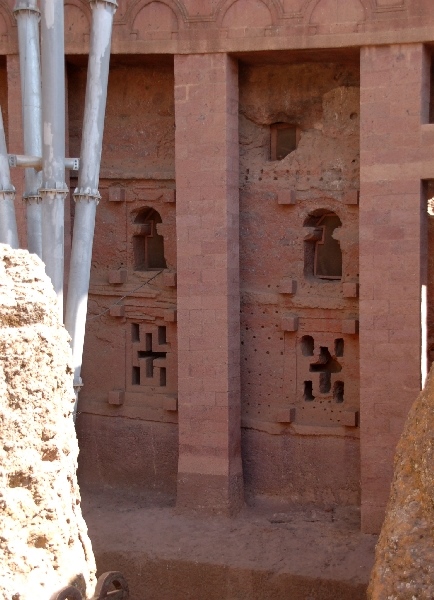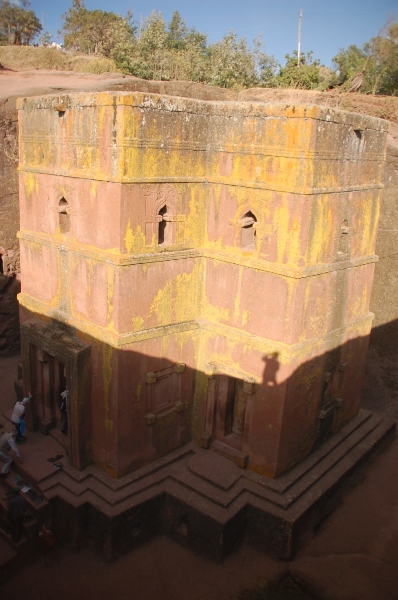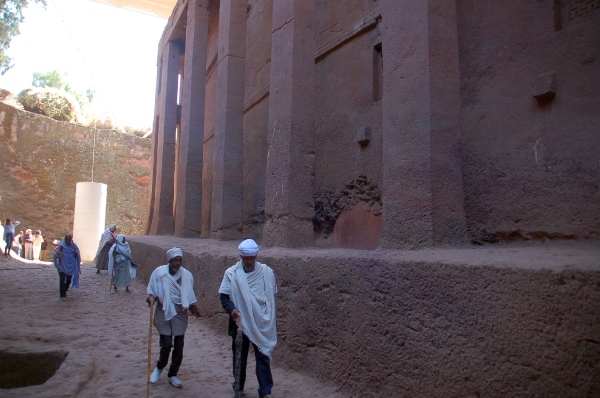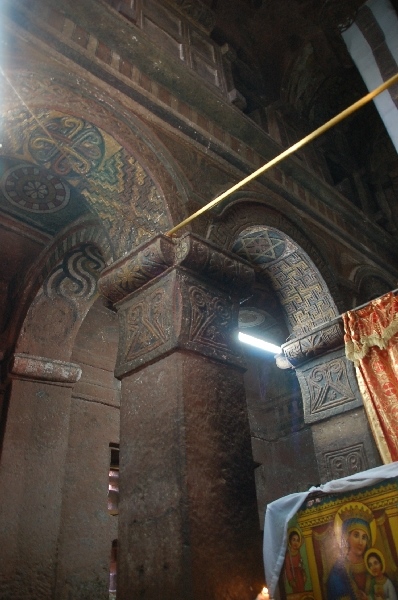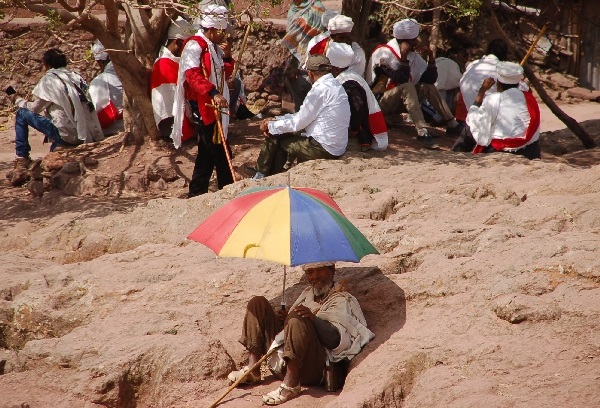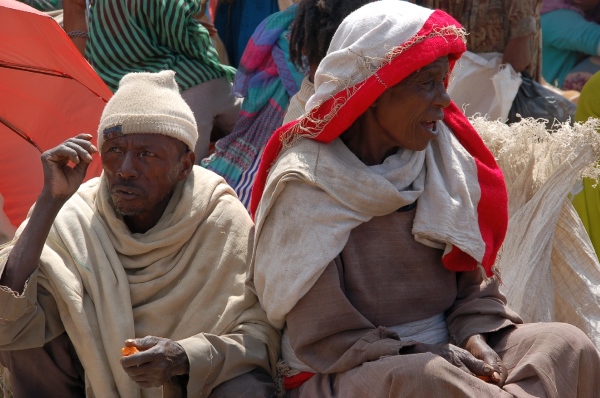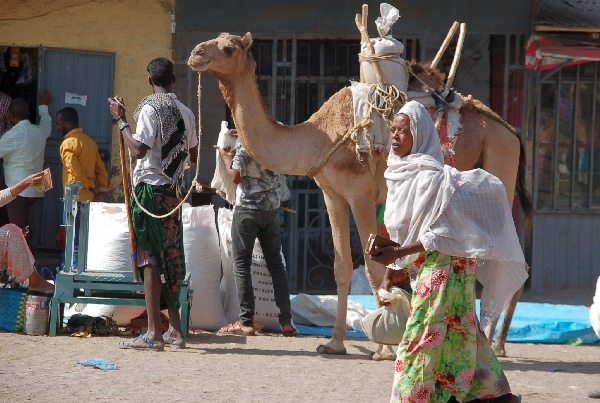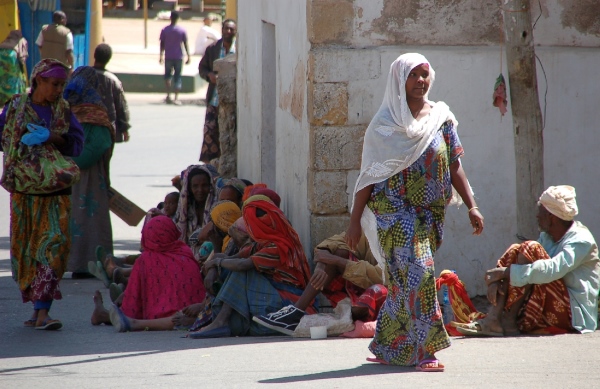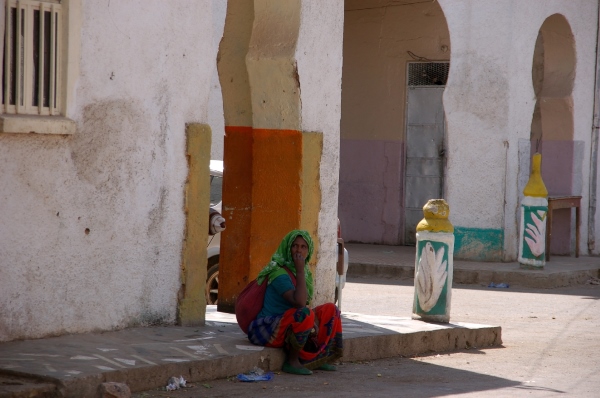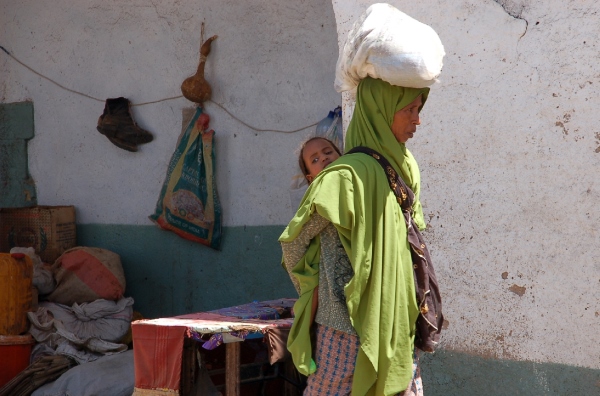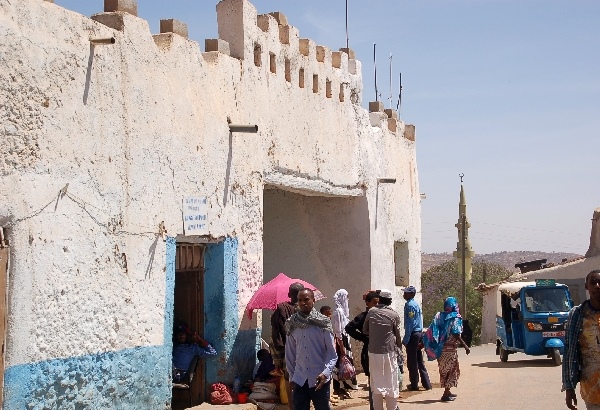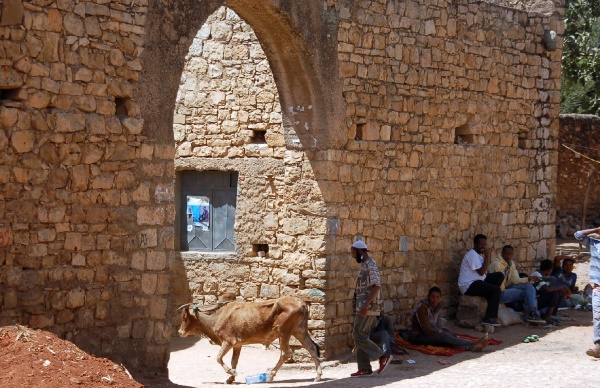World traveler Clown Tom Bolton
Adventure stories & photos

Tom’s travels to Ethiopia – part 2
Travels to Ethiopia continued, Axum to Merkele
Link to Ethiopia – part 1
From Axum I got an early morning public bus. I had been informed that there was a bus to Wukro where I actually intended to go. Upon arrival, the security people made me wait at least 20 minutes before entering the bus compound. Then when I got to the bus they took my baggage, threw it on the roof and then claimed I would have to pay much more than I knew the price to be. They then decided that the bus was full and threw my backpack off of the roof. For the same inflated price they said I could take the bus next to it to Merkele. Usually the main route to Merkele goes over Wukro so I figured they wanted to charge me the full price. I had no problem with this expecting I would still get to where I wanted to go. There was a friendly couple from Slovenian headed to Merkele so at least I would have somebody to chat with. The alternative was to stand around at 5 in the morning in the unlikely chance another bus to Wukro would materialize.
The ride itself was not bad but as I was to find out, it took another route and did not go through Wukro. Thus I landed in Merkele sooner than expected. The city seemed top be rather affluent with a large University student population. What it lacked was a sense of charm. The main attraction was a former palace for Emperor Yohannes IV that was now a museum. Not only did one get searched before entering but you had to leave your passport in the office during the visit. Interestingly, while going through all visitors were presented with a long questionnaire that originated from a Indian doctoral candidate. It asked in depth things about tourism in Ethiopia that was basically a list of what his work should answer. Like how should a tourist know not having done the research? I wrote on the paper that if I could answer the questions then I should be the one being awarded the degree. The photo below left was the main palace building and the one to the right had bedrooms and storage places. No photos were allowed inside.
Wukro, rocked hewed church
My second day in Merkele I did a day trip to Wukro to the north. This area of the country is called Tigray and it is known for its churches carved out of the stone hillsides rather than constructed. Most are said not to be overly beautiful but in extreme settings often on remote hill tops that takes hour of hiking to get to. The problem is getting to a point where one can even reach them. Even the ones often referred to as being in a cluster are often quite some distance apart. There is no regular transportation to get to them. It inevitably means hiring a private vehicle for a day. As a group; doable. As a lone traveler this was beyond my budget.
In Wukro there is such a church just outside the city limits reachable by foot. This ended up being the only one I managed to see. I saw no travel agencies or other tourists around. Upon reaching the Wukro church there was a German family with a van, just leaving. Unfortunately, I hesitated to talk to them and missed my potential opportunity. Even if they would have taken me along, I didn’t want to make them wait nor miss seeing the church I had just spent a couple of hours getting to. And I never saw another westerner the whole day.
So here are my photos of the rock hewed church. Of course such an architectural undertaking is a lot of effort yet one cannot say they did an overly good job. It is not like things were finely done with elaborate carvings. The decorative features were painted on or done by adding carpets and tapestries. Yet one could still say that it had a certain simplistic beauty to it.
Flight from Merkele to Lalibela
While in Merkele I started to inquire about getting bus transportation to Lalibela. I was told that buses in that direction were not running as there was some kind of civil unrest happening in the city of Woldia. There is an alternative route but it is unpaved and has no regular bus service. Even finding fellow tourists to share a vehicle to get there was said to be a danger. Nobody could say when the situation would change so I felt obliged to take a flight. The flight to Lalibela was only 45 minutes but cost 85 USD while buses would have cost less than 10. I had already spoken with Ethiopian Air employees in Bahir Dar about getting the large discount for internal flights that is supposed to be given to all international travelers that fly in or out of the country with them. The upshot after a lot of double talk was “sorry; no discount”. I hadn’t actually intended any such flights but as the land travel situation became complicated it would have been a definite option.
At my hotel in Merkele was a Belgium couple that ended up in the same situation and were on my flight. They were quite interesting. He worked for Doctors without Borders and had been in Ethiopia for 3 months working in refugee camps. He and his wife had actually met in Ethiopia 27 years before. Yet back then there were even more serious political problems and travel was very limited. Thus neither had ever been to Lalibela, the most visited tourist attraction in Ethiopia. I ran it by him the idea that I would gladly volunteer to do shows in the refugee camps. Like I expected, he confirmed that the regulations and paperwork were very complicated. One does not just show up and get into such a camp. Nor can a worker, even a doctor, just bring you in. It would have meant a long ordeal of contacting and petitioning the right officials; a time consuming endeavor that might not even succeed.
Constant begging in Lalibela
Anyway, I made it to Lalibela. Along the way I met Michael, an American lawyer from California who was also on my flight. We both ended up at what seemed to be the cheapest hotel in town but also the most centrally located. We ended up visiting the sites together and had some great discussions about traveling. He had also spent a lot of time in Latin America and Asia and was 5 months into a trans-African journey. Interesting was his assertions that Ethiopia was the most frustrating country he had been to in Africa. Particularly annoying was the begging, which turned out to be worse in Lalibela than anywhere else on this trip. Years of tourists coming to Lalibela had conditioned not only the kids but even adults to beg. The kids asked for pens and/or money. Some young adults literally wanted the cloths off of my back and tried to pressure with saying that it was some kind of moral obligation to do such charity.
I had no problem to be straight forward and just say “no”. With the kids anyway, I always distracted them with a few simple magic tricks. I always managed to take things with a sense of humor but can imagine one getting jaded after a long travel. My personal perspective was that I had experience much worse in a number of other countries. More irritating for me in Laibela were the constant flies. They didn’t bite but were very persistant about landing on you. It was seldom that I felt people in Ethiopia were truly dishonest or trying to cheat me. Giving people the benefit of the doubt there was more conflicts of communication and possible ways of interpreting things. For example, me and my 2 Slovenian companions all got short changed 10 birr on our bus tickets between Axum and Merkele. Otherwise, I nearly always got proper change even if things were sometimes off up a birr or 2.
Lalibela historical sites
More contentious was the entrance fee to the Lalibela sites. The price was 50 USD for a ticket valid for 4 days. But not sure what one would do for that long. We easily saw everything in detail in a day and a half. The sites were 2 clusters of connecting churches and ditches and a separate church. All of the churches were hewed out of the rock, mostly from above rather than into a hillside as is common in the Tigray region. All of the sites are still used as places of worship. Our second day in Lalibela we got up early to experience the pilgrims that should be attending prayers in the Bet Giorgias church. We could hear some chanting within but there was hardly anyone around none the less a flood of devotees.
An interesting note is that within one of the Lalibela complexes is the “Tomb of Adam”. Yeah, first guy ever and don’t ask who it was that built the tomb and put him there. Must have been Cain or Able and the Garden of Eden must have thus been in Ethiopia. Not that any reasonable person takes the story of Adam and Eve literally. But with finds like Lucy and other early humanoids in the country, why shouldn’t the religious myths fit the scientific data about where man might have arisen? But since they claim to have the Ark of the Covenant, the only things I was surprised not to see were original nails from Jesus’s cross. Then again I’ve seen hundreds of those throughout the world.
Lalibela ceremony
On my second day in Lalibela we had returned early to the single church Bet Giyorgi but saw few pilgrims. Yet just below this site there was an event of some kind starting up. Many men with their finest cloths were waiting around and there were speakers set up. We were told that a delegation of important people were supposed to visit including someone from the US embassy or possibly from UNESCO – depending on who you believed. But having no idea how long it might be until things really started I took some photos and we went on to see the other Lalibela sites.
Lalibela weekly market
Like many countries with a large rural population, market day is a big event in most Ethiopian towns. People come from afar to buy, sell and congregate. I was fortunate to be in Lalibela on market day. Walking around visiting the sites earlier in the day one saw a flow of people headed with their animals to the market. Around mid –day, Michael and I went to stroll through the market. All kinds of household goods were sold. Livestock was group together so there was a section for cattle, one for goats and another for chickens. If nothing else Lalibela’s market was colorful.
Performance at Lalibela market
After going through the Lalibela market we left to get some lunch and take a rest at the hotel. Later we returned with my juggling equipment to do a show. About 70% of the people had already left so we could have timed it better. I had seen a spot just outside of the market that was spacious and would be protected from people strolling through my space. But it didn’t seem so sensible now that there were so fewer people. So I found a place by a wall just on the edge of the market. Problem was that it was a situation where I often had people herding their animals through. I made fun with the situation but it was less than ideal. The people were a bit more nonchalant about checking out what was going on than I would have expected but once I got some people watching people appreciated it. The advantage for me in Lalibela compared to other towns was that Mike could partially keep an eye on my bag and take some photos with my camera. I was later to do an even bigger show in Harar but had nobody to take photos or watch my gear. People seemed to get my gags and like the tricks so the biggest difference to performing in Europe was that one usually ends up with less goat and cow shit on their shoes.
Bus trip Lalibela to Dessie
My next destination was southeast to Dessie. Mike was headed to Gondar and we shared tuk-tuk to the bus station a ways out of town – of course around 5 am. According to the map there was a fairly direct route but we ended up taking the longer route on better roads. The surprise about this was that we went right through the city of Woldia where the recent civil unrest had taken place. The bus actually toured through the center of Woldia to get to a gas station. We saw no violence but many of the buildings on the main road were 5 or 6 stories high with all of their windows broken. A few were totally burned out. It was late afternoon before we arrived in Dessie. I had the name of one recommended hotel but all of the hotels nearby were full due to some kind of a medical convention. I had the name of another place but it would have meant a long taxi ride. I just looked on my own and found a really nice, secure but relatively cheap place. Just went to show that the guidebooks are often not well researched and finding something on your own often lead to the best deals.
Dessie itself was not interesting at all although very busy. The reason to stop there was to break up the trip and from there one could get a luxury bus the rest of the way to Addis Ababa. In the meantime, I had the next day free to make a daytrip to the market in Bati via Kambocha. The Bati market should be one of the biggest one’s in Ethiopia. It had more food and other goods but less animals. But what it did have that one didn’t see at the Lalibela market were camels. To the east of this region are salt flats and it is said camel caravans are still known to show up with salt. There were plenty of camels but most seemed to be transporting chat, wood or other goods. Didn’t see any salt being transported. Also didn’t see any other tourists except one Italian guy who greeted me.
Bati market handicapped beggar, goats on roof
My experience in Bati was very positive. But a couple of things were rather disturbing. One was seeing this handicapped guy begging. His body was misshaped like a human pretzel. He was partially covered by a cloth most of the time. He moved around a lot while groaning loudly. It just seemed rather shocking someone in this condition would have to publically beg. I gave him a good donation but still felt bad. Then in the bus parking lot while leaving I saw these poor goats tied up on the roof of a van. It’s one thing to be taken to market but to be tied up in the hot sun and transported like that is just cruel. They got a measure of revenge though. One of them had just pissed all over the guys who put them there. If one looks closely, one can see drops still falling from the van.
Dessie to Addis Ababa
I got the early morning Salem luxury bus from Dessie to Addis Ababa. It was supposed to stop on the main road not far from the public bus station. The area looked rather shaky to say the least. Many young guys were sleeping on the sidewalk looking to be drunk or possibly buzzed on chat. A number of them were burning paper and garbage to stay warm. I showed up just on time yet the bus was not there yet. At least one young guy came to beg and did so in an intimidating way. I was ready to defend myself but luckily there was some kind of a club right there that was open all night and the bouncer hung around and made his presence felt so I think that helped make the guy think otherwise than trying to cause trouble.
Booking transportation to Harar
It was just early afternoon when we arrived in the capital city of Addis Ababa. I had seen that there was an office for the Salam buses across the street but the guy controlling the luggage, who spoke reasonable English, told me that they were not longer going to my next intended destination of Harar. It wasn’t clear if it was just Salam bus (someone said they had problems for non-payment of taxes) or all buses due to more civil unrest. I went over to ask anyway but saw that there were about 50 people waiting ahead of me. A few doors away though was the city tourist office. The woman there said there were indeed problems, probably no buses and she couldn’t predict when that would change. She called to the biggest travel agency the ETT and they sent someone to pick me up. She said they would organize tours to Harar on almost a daily basis and should be able to offer me alternative travel possibilities.
The people at the ETT seemed friendly but they immediately tried to get me to take expensive tours to places like Danakil and I had to say strongly that I had no interest. To get to Harar they said they could only arrange a private vehicle but I would have to pay for it myself. The other option would be to fly. They said they could get me a discount since they are the biggest agency but this would still cost me 150 USD round-trip. Eventually I just gave up and got them to take me to the Piazza area. This time I stayed in the Baro hotel which turned out to be much nicer than the Itegue Taitu where I had stayed before. At least the better rooms were nicer and I enjoyed the plant filled courtyard that turned out to have one of the best wifi I had found. And I had sometimes gone up to a week without getting emails.
The guy running the hotel was very helpful. He said the only luxury bus line still servicing Harar was called Gedu but it turned out that there were no seats available for the next few days. I could get a public bus the day 2 days later. I pay a rather large premium for them to pick up the ticket but they promised a reliable taxi, for a price to get me to the station. Everything went as planned but it did get a bit tense. The bus was to leave at 5.30 and the station was a mad house. It was dark and there seemed to be hundreds of buses. One guy took it upon himself to help me out and even he admitted that it was very confusing. Eventually I spotted the proper bus myself. I had worried for nothing that it would leave since it became a game of musical chairs getting everyone on board and we left an hour late.
Panoramic views through the mountains
I knew that much of the eastern part of the country should be relatively flat. That is why they had been able to build a train line that direction that connected to the neighboring country of Dibouti, the only place with a ship connection. Yet the route turned out to be very mountainous. Not the steep hazardous road I had experienced say north of Debark but a long chain of continuous inclines and declines. The views were very nice but the trip ended up taking 13 hours. We could have saved at least an hour but once we got near Harar the bus kept stopping. And of course people had to have their luggage brought down from the roof.
Good accommodation & restaurants in Harar
In Harar I went to the Wonderland Hotel. It was ideally located just outside of the old city. It had been highly recommended to me and turned out to be the most luxurious place I stayed. It also cost the most but not by much and there was breakfast included. Bad luck for me that the only stomach problem I had was after eating their breakfast the next morning. I had eaten a lot of eggs and later had some loose stool, gas and belching. As it smelled of sulfur I suspected it might be a case of giardia. But this passed after a day so the eggs were just a bit off. There turned out to be a couple of pretty good restaurants close by so food was not a problem.
Old city of Harar – unique architecture
The old city of Harar known as Jugal, is a warren of narrow streets lined by colorful mud houses. It is surrounded by a high wall with just a half dozen gates and a couple of improvised small openings giving access. The majority of the people seemed to be rather poor but colorfully dressed. It is widely known that hyenas live in the area and can often be seen strolling the streets at night. In the evening there are a couple of spots where they are even feed. Still wild but they have been conditioned to take food from people and are said not to be a danger. This tradition is said to predate any tourism but of course has become a commercialized item. I considered it but never committed to doing it. One could hear dogs barking loudly most of the night, although they were mostly docile and silent in the rest of the country. Thus I assume they were reacting to roaming hyenas. And as tame as they might be, I wondered how many house pets are lost in the end to them.
Ras Tafari House – Sherif Harar City Museum & Arthur Rimbaud Center
The attraction of the Harar old city is the city wall, gates small houses and the residents. There are few buildings of any note there with a couple of exceptions. One is the Ras Tafari House – Sherif Harar City Museum. Still privately owned this is now a museum. Originally the home of a wealthy Indian trader it became known as the place Ras Tafari spent his honeymoon. After becoming the leader of Ethiopia he changed his name to Haile Selassie. And yes, the name Rastafarians the movement from Jamaica that Bob Marley belonged to was named after him. He became a figure for their idolization since he represented the only country to never have been colonialized. The fact that they were occupied for some years by the Italians doesn’t seem to count.
Close to the Ras Tafari House is the Arthur Rimbaud Center. It is a museum dedicated to Rimbaud but he never lived there. Also built by a Indian merchant, it is said Rimbaud had lived in a house that formerly stood on the property. The French writer and traveler ended up spending the later part of his short life in Harar. An exception to the rule that foreigners were not accepted back then.
Harar Mosques & Islamic shrines
Unlike in central Ethiopia, the majority of the people in the Harar region are Muslim. In and around the old city are many small mosques and shrines to beloved Islamic religious figures.
Harar to Addis in train via Dire Dawa
I liked Harar but in the end stayed longer but saw less than expected. The day after I got there I already started planning my trip back to Addis Ababa. I went looking for the Salam and Sky bus offices. They no longer existed. I was told that the only luxury bus line was one called Geda and its office was some kilometers up a hill. It took a Tuk-Tuk and found the place was just a tiny kiosk. They said the first available seat would be in 3 days but they only issue the tickets the day before. So I had to sign up on the list. One usually gives a local number but as I never got an Ethiopian sim card I said they should contact me at my hotel if needed. So it was a Sunday morning that I returned to get my ticket. But they told me all buses, public and private, were cancelled until further notice. More civil unrest was the reason given. Supposedly they had called my hotel but I had never gotten any message about the situation.
It seemed there were no big travel agencies in Harar and being a Sunday they would have been closed anyway. The hotel recommended a company with private vans but they also said they weren’t going. I asked in my hotel and started to look around for other tourists who might be able to share a vehicle to Addis or a taxi to Dire Dawa. Dire is just an hour or so to the north and much larger. It not only has an airport if worse came to worse but the Addis – Djibouti train stopped there as well. I had heard there were problems with the trains running over herds of animals but in this situation it might be the best option.
I got lucky. A group of young travelers showed up in the Wonderland Hotel looking to use the wifi. They were trying to arrange van to Dire Dawa so they could get the train, for which they already had tickets, the next morning. They had also found 3 guys needing to catch an early plane from Dire Dawa as well. They had advantages to organizing as one of them was originally from Ethiopia and spoke reasonable Amharic. One of the guys flying worked for the Austrian Embassy. I hooked up with them and checked out although I had already paid for the night. Without even asking, I was refunded half of the money. The van with driver we arranged got to Dire Dawa without problem.
Mekonnen Hotel Dire Dawa
The core group of Alex, Jacque, Tarhas and Giovani had reservations at the nice African Village Hotel. They were full up so the Austrian guy and his 2 Polish companions found a room at a close by hotel which they shared. The “suite” they offered me would have been the same price and too pricey. So I went to a cheap but recommended place the Mekonnen Hotel right across from the old train station about 2 KM away. Shown here is the old train station that is now a museum photographed from my hotel balcony.
The owner of the hotel was very friendly and inquisitive. His English was good as he had lived in India for 9 years. Between what the Austrian guy had heard from the embassy and the hotel owner is seemed that the situation was explosive. I later confirmed online that while I was in Harar there had been an incident near Harar in a camp for internally displaced people. Some kind of protest and taken place and the police shot and killed 14 people.
Military & police event in Harar
On my way in Harar back from my failed attempt to get my reserved bus ticket I had seen the main street was blocked. There was an event with loud music and dancing, a marching band and lots of police and military. Curious was that very few civilians were watching. The atmosphere seemed tense but I still took a couple of photos.
What I later concluded was that this was part of a propaganda campaign by the government to hold such events and parades to promote the image of the police and military. Unfortunately, many say that the current government is often repressive. Ethiopia also suffers from occasional droughts. That it has such neighbors as Sudan, South Sudan, Somalia, Somaliland, Eritrea – and Yemen is not far – just adds to the turmoil. One could also be happy that it is still visit-able at all.
Blocked streets from civil unrest
The hotel owner said there were problems in the center of Dire Dawa and thus he closed early. In the morning he lined me up with a Tuk-Tuk to try to get me to the new train station about 10 KM away. The drier was very nervous. He kept stopping other vehicles going in the other direction to ask about the situation ahead. At one point he turned back. After driving a few hundred meters he stopped and got hotel owner on phone who said there were problems on the road. I said we could turn back if we saw anything threatening but he had given up before we saw anything. So he continued direction train station. We came to a part of the road where there were about 30 heavily armed police who were clearing the huge stones people had thrown into the street. Vehicles were getting through but this was too much for my driver and he immediately drove the 5 Km back to town. I got him to drop me off at the African Palace where the others were staying.
I would have connected up to go with them in the first place but I wanted to get there very early since I had no ticket. The train service is so new that not many people know about it but with the bus problems I figured many people might opt for the train. What we didn’t know is if it would even be running. There is no way to get such information. Now we crowded 5 people with luggage into a single large Tuk-Tuk. There were still many stones in the street where my driver turned back but nobody around and we continued on. A kilometer or two before reaching the station we had to go through a village. There were hundreds of people lining the streets. In addition were 50 to 100 police and military. Lots of stones were in the road but it was passable. When they saw we were tourists, they waved us through the control point.
Dire Dawa new Train Station
At the station I got a ticket. It cost over 600 Birr so double the cost of a luxury bus and double what locals had to pay. My seat was somewhere else in the train but there were actually plenty of seats free so I could join the others. Going into the station was the most extensive search I have ever been through. They opened every pocket and removed everything from my backpack and daypack. Every jacket and pants pocket was turned inside out. They found my Swiss army knife but let me keep it. 2 others in our group had theirs confiscated. I don’t know if the present situation made things worse but it appeared that this was normal procedure. In the seats behind us were 2 armed soldiers and 3 Chinese who appeared to be the conductor, manager and a guy without uniform who I assumed was an interpreter.
The trip was pretty uneventful. As expected, the route was mostly flat and the countryside even drier than usual. The train stopped a couple of times. Possibly due to run-over livestock but nothing dramatic like a whole herd of something. It was already dark when we arrived in Addis. The station there is also about 10 Km south of the center. Fortunately my companions had contacts there and we not only got picked up but they took me all the way to my hotel in the Piazza area which was out of their way. On the other hand there was not only no traffic but no people on the streets. I don’t know if there was an official curfew or if people voluntarily stayed in to avoid any problems. I had a couple of days before my flight home but I didn’t dare to leave Addis. There were a few places to south I would have liked to see but c’est la vie. The manager of the Baro hotel told me that there had been a death in his family and he had been unsuccessfully to get to the out of town funeral because of the transportation problems. In the end I came out pretty well.
Fekat Circus School
I spent most of the following days just chilling out at the Baro hotel. I also went to visit the nearby Fekat Circus School. I had found out about them in the internet before I left Europe. I had made a short visit upon arrival but had wasted a good 3 hours walking around trying to find them. I turned out they were less than 10 minutes’ walk from my hotel but Google maps had directed me someplace else. And a lot of people tried to assist me but were never competent on giving proper instructions. Of course people in the neighborhood also claimed never to have heard of them. I took my juggling equipment and trained and showed them what I could do.
The school is down a quiet side road with a nice building for the offices and accommodation. There was a courtyard and another 3-sided building with a high roof for training. They were surprisingly well-equipped with trapeze, teeter board, unicycles, juggling equipment, gymnastic mats, walking globe etc. But since I know good juggling equipment is expensive and has to be brought from Europe or America I left them my balls and clubs and had brought a bunch of extra knobs to repair clubs with. They were organizing an upcoming festival for the second time that would include dozens of circus school groups from across Africa. They were rehearsing the show they wanted to present so didn’t have so much time to juggle with me as I had hoped.
In the internet I had read that the property had been sold and they didn’t expect to be able to stay at that location for long. They had done a donation action to buy and ship a large circus tent from Europe. Supposedly it was sitting in Djibouti but it all sounded a bit strange. They had been requesting something like 20,000 dollars just to transport the tent from Europe. For a fraction of that cost one would think they could get something made locally. Or possibly buy the property they were on. With a tent they would still need land to set it up on.
Everyone was friendly and some of them spoke passable English but I never felt I got the whole story about moving and the tent. A month or so after I returned home I saw pictures in the internet from the circus festival they held. And there it was – an amazing large circus tent! Seems it really exists and it will be interesting to see what they can arrange for a permenant site for it. The few photos I took at the school didn’t turn out very well. I used my cellphone rather than my Nikon and glare from the sun ruined most of them but here is what I have.
So, those were just a few tales from my many travels over the last thirty and something years. I hope you've enjoyed another side of a traveling clown! If you want, write me an email or better yet, book my show or set a link to this website or just state me as the beneficiary of your will!
To book or see more information about Tom's clown show and entertainment, visit one or both of his clown websites:
Clown Stuttgart www.clowntombolton.com
Clown juggler Stuttgart, Gremany www.clown-event.de











